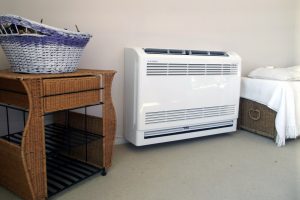 Most of us are used to centralized air conditioners and forced-air furnaces in our home. They generate cool air or hot air in a single locale and then blow it through your home via a system of ducts. They’re efficient and inexpensive, but they’re not the only type of HVAC system out there, and depending on your home, an alternative model might be a batter fit for you. The autumn makes an excellent time to assess the state of your HVAC system. If it’s older and you don’t think it will last another year, now might be an excellent time to consider an alternative form of heating and/or cooling. We’ve provided a short list of alternative options below for you to peruse.
Most of us are used to centralized air conditioners and forced-air furnaces in our home. They generate cool air or hot air in a single locale and then blow it through your home via a system of ducts. They’re efficient and inexpensive, but they’re not the only type of HVAC system out there, and depending on your home, an alternative model might be a batter fit for you. The autumn makes an excellent time to assess the state of your HVAC system. If it’s older and you don’t think it will last another year, now might be an excellent time to consider an alternative form of heating and/or cooling. We’ve provided a short list of alternative options below for you to peruse.
Ductless Heating and Air Conditioning Systems
Not every home can support the system of ducts that an HVAC unit needs to function. We live in an old part of the country, and many homes in the area were built before the advent of air conditioning. Others simply possess architectural quirks that make a centralized system difficult if not impossible. Ductless systems offer a solution in such cases because they get rid of the centralized format. Instead of one unit generating hot or cold air, it spaces multiple smaller units throughout your home: each one charged with maintaining comfortable temperatures for a single room or section. They let you run the HVAC system only in those parts of the home you want – saving you money on monthly bills – while allowing individual family members to tailor the temperatures to taste in individual sections of the home.
Heat Pumps
Heat pumps are a combination heater and air conditioner, using the principles of air conditioning (circulating refrigerant) to provide both heating and cooling power in the same way. They have become much more efficient in recent years, which makes them an increasingly attractive choice, and hybrid units (which use a smaller furnace to compensate on the coldest days) are available as well. Because they use refrigerant (which theoretically never runs out) to heat the home instead of gas or other forms of fuel, they tend to cost less to run during the winter months than other types of heater. And because they run on the principles of air conditioning, they can do that while still keeping you reliably cool in the summer.
Geothermal Systems
When you dig down below the ground – beneath about 12 feet or so – the temperature of the earth never changes no matter how hot or cold it is on the surface. Geothermal systems take advantage of that to provide inexpensive and environmentally friendly heating and cooling power. Coils are buried beneath the earth (or sometimes in a pond or body of water when the property has such features), circulating a mixture of water and antifreeze that can release heat from the home into the ground in the summer, or pull heat from the ground in the winter. It requires a hefty installation fee, as well as property large enough to support the system.
If any of these HVAC systems feels like a good fit for your Maryland home, or you already own one and it needs a little care, call on Atlantic Refrigeration & Air Conditioning, Inc. today!
